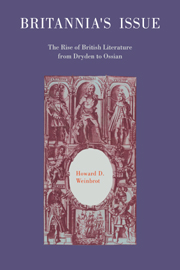Book contents
- Frontmatter
- Contents
- Acknowledgments and editorial notes
- INTRODUCTION: An overview of scope and method
- PART I CONTEXTS: INTELLECTUAL, PSYCHOLOGICAL, AND NATIONAL
- Prologue to Part I
- 1 MODERNS, ANCIENTS, AND THE SECULAR: THE LIMITS OF SOUTHERN HEGEMONY
- 2 THE SPIRITUAL: TRUTH WAS NOT THE INCLINATION OF THE FIRST AGES
- 3 AN AMBITION TO EXCEL
- 4 THE MAKING OF A MODERN CANON
- PART II TEXTS WITHIN CONTEXTS. ESSAYING ENGLAND: OUR GENIUS, OUR CLIME
- PART III GROWING ONE'S OWN. THE BRITISH ODE FROM COWLEY TO GRAY
- PART IV EXPANDING THE BORDERS. JEWS AND JESUS: THIS ISRAEL, THIS ENGLAND
- PART V CELTS, GERMANS, AND SCOTS: TOWARDS A UNITED KINGDOM
- APPENDIX: The text of Handel's “Israel in Egypt”
- Index
2 - THE SPIRITUAL: TRUTH WAS NOT THE INCLINATION OF THE FIRST AGES
Published online by Cambridge University Press: 15 December 2009
- Frontmatter
- Contents
- Acknowledgments and editorial notes
- INTRODUCTION: An overview of scope and method
- PART I CONTEXTS: INTELLECTUAL, PSYCHOLOGICAL, AND NATIONAL
- Prologue to Part I
- 1 MODERNS, ANCIENTS, AND THE SECULAR: THE LIMITS OF SOUTHERN HEGEMONY
- 2 THE SPIRITUAL: TRUTH WAS NOT THE INCLINATION OF THE FIRST AGES
- 3 AN AMBITION TO EXCEL
- 4 THE MAKING OF A MODERN CANON
- PART II TEXTS WITHIN CONTEXTS. ESSAYING ENGLAND: OUR GENIUS, OUR CLIME
- PART III GROWING ONE'S OWN. THE BRITISH ODE FROM COWLEY TO GRAY
- PART IV EXPANDING THE BORDERS. JEWS AND JESUS: THIS ISRAEL, THIS ENGLAND
- PART V CELTS, GERMANS, AND SCOTS: TOWARDS A UNITED KINGDOM
- APPENDIX: The text of Handel's “Israel in Egypt”
- Index
Summary
VAIN WISDOM AND FALSE PHILOSOPHY
The Ancients were darkened by an immovable cloud. For all their often admitted genius, they were pagans and thus by theological imperative were inferior to the Christians who superseded them. This imperative sometimes was neglected during the Renaissance, when exuberant syncretism could merge the Christian with the pagan. Such blending also evoked its opposite, as in Milton's already commonplace insistence in Paradise Lost (1667) that the wisest ancient learning is “Vain wisdom all, and false Philosophic!” (2: 565). By Paradise Regained (1671) classical arts become one of the futile temptations of the devil, which the Son labels “false, or little else but dreams, / Conjectures, fancies, built on nothing firm” in contrast to the “Light from above” that supplies the only needful doctrine (4: 291–92, 289–90). Indeed, were the Son to please or “instruct” Himself with music, poetry, and lessons of wisdom, He would turn to “our native Language” (4: 332) – Hebrew, but perhaps by a reader's extension English – in which God and man are “prais'd aright” (4: 348). There one finds “better teaching / … Than all the Oratory of Greece and Rome” (4: 356, 360).
This wisdom, drawn in part from St. Augustine and the Church fathers, made more of an impression upon the defeated devil than on Milton's later contemporaries, for it wanted frequent repeating.
Christian anti-classicism takes several forms, one of which amplifies the Son's preference for inspired Hebrew rather than misguided classical discourse.
- Type
- Chapter
- Information
- Britannia's IssueThe Rise of British Literature from Dryden to Ossian, pp. 48 - 77Publisher: Cambridge University PressPrint publication year: 1993



